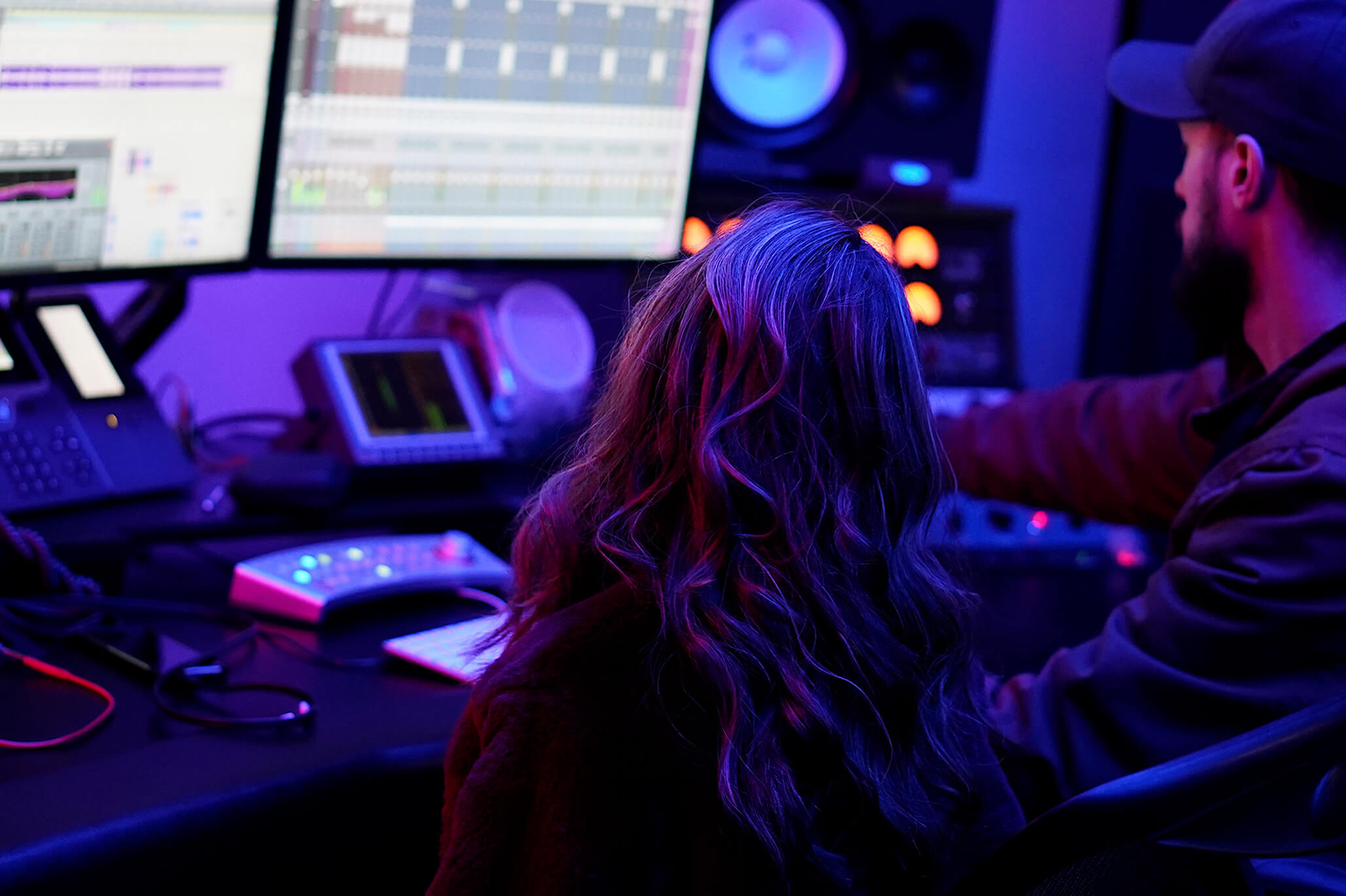Home>Production & Technology>Record Label>How To Become A Record Label Manager


Record Label
How To Become A Record Label Manager
Published: January 24, 2024
Learn how to become a record label manager and oversee all aspects of the music industry, from talent scouting to marketing and distribution. Start your career in the exciting world of record labels with our comprehensive guide.
(Many of the links in this article redirect to a specific reviewed product. Your purchase of these products through affiliate links helps to generate commission for AudioLover.com, at no extra cost. Learn more)
Table of Contents
- Introduction
- Understanding the Role of a Record Label Manager
- Developing a Strong Music Industry Network
- Acquiring Knowledge and Skills in the Music Business
- Building a Solid Artist Roster
- Effective Artist Development Strategies
- Negotiating Contracts and Deals
- Marketing and Promoting Artists and Releases
- Managing Finances and Budgets
- Overseeing Distribution and Licensing
- Handling Artist Relations and Public Relations
- Utilizing Technology and Digital Platforms
- Staying Up-to-Date with Industry Trends and Changes
- Conclusion
Introduction
Being a record label manager is an exciting and rewarding career in the music industry. It involves working closely with artists, overseeing every aspect of their careers, and driving their success in a highly competitive market. If you have a passion for music and a strong business acumen, becoming a record label manager can be a fulfilling path to explore.
In this article, we will delve into the role of a record label manager, the skills and knowledge required to excel in this position, and the strategies needed to build and manage a successful record label. We will discuss the importance of developing a strong network, acquiring knowledge of the music business, building a solid artist roster, implementing effective artist development strategies, negotiating contracts, marketing and promoting artists and releases, managing finances, overseeing distribution and licensing, handling artist relations, utilizing technology, and staying up-to-date with industry trends.
Whether you aspire to start your own record label or work at an established one, this article will provide you with valuable insights and guidance on how to become a successful record label manager. So, let’s dive in and explore the exciting world of record label management!
Understanding the Role of a Record Label Manager
A record label manager plays a pivotal role in the success of a record label and its artists. They are responsible for overseeing the day-to-day operations and long-term strategy of the label. This includes scouting and signing talent, managing artist development, negotiating contracts, overseeing marketing and promotion campaigns, handling finances, and building relationships with industry professionals.
One of the key responsibilities of a record label manager is to scout and sign talented artists. This involves actively searching for new and emerging artists, attending live performances, listening to demos, and assessing their potential for success in the music industry. Once signed, the record label manager takes on the role of guiding the artist’s career, providing support and resources to help them grow and achieve their artistic goals.
Artist development is another crucial aspect of a record label manager’s role. This involves working closely with artists to help them refine their sound, develop their brand, and create a compelling image. The manager may collaborate with producers and songwriters to ensure the artist’s music is of high quality and commercially viable. They also assist in organizing photo shoots, music videos, and other promotional materials to create a strong visual identity for the artist.
Negotiating contracts is a fundamental skill for a record label manager. They must have a deep understanding of contract law and be able to negotiate favorable deals for both the label and the artist. This includes securing record deals, publishing agreements, licensing deals, and distribution contracts. The manager must ensure that the terms of the contracts are fair and reflect the artist’s best interests while aligning with the label’s goals.
Marketing and promotion are vital components of building a successful artist’s career. A record label manager is responsible for creating effective marketing strategies that raise awareness about the artist and their music. This involves planning and executing promotional campaigns, securing media coverage, coordinating social media efforts, and organizing live performances and tours. The manager must have a good understanding of the target audience and how to reach them through various marketing channels.
Managing finances is another essential aspect of a record label manager’s role. They must have a keen eye for budgeting and financial management to ensure that the label operates within its means. This includes allocating funds for artist development, marketing, distribution, and other expenses. The manager must monitor revenue streams and royalty distributions to ensure that the artist and the label are both financially supported.
Building relationships with industry professionals is crucial for a record label manager. They must network and establish connections with music producers, A&R representatives, concert promoters, agents, and other key players in the industry. These relationships can lead to collaboration opportunities, exposure for the artists, and access to valuable resources.
In summary, a record label manager plays a multifaceted and dynamic role in the music industry. They are responsible for scouting talent, guiding artist development, negotiating contracts, managing finances, and overseeing marketing and promotion efforts. By understanding the intricacies of this role, aspiring record label managers can lay the foundation for a successful and fulfilling career in the music business.
Developing a Strong Music Industry Network
In the music industry, networking is key to success, and building a strong network is a crucial aspect of being a record label manager. A robust music industry network can open doors to new opportunities, connections, and collaborations that can help propel your record label and its artists forward. Here are some strategies for developing a strong music industry network:
- Attend industry events: Industry events such as music conferences, showcases, and festivals offer valuable networking opportunities. Attend these events, participate in panels and workshops, and interact with industry professionals, artists, and other record label managers. Exchange contact information and follow up with potential connections to nurture the relationships.
- Join industry associations: Become a member of industry associations such as the Recording Industry Association of America (RIAA), the American Association of Independent Music (A2IM), or local music industry associations. These organizations provide networking events, educational resources, and access to industry professionals.
- Use social media: Social media platforms like LinkedIn, Twitter, and Instagram can be powerful tools for networking in the music industry. Connect with industry professionals, artists, and other record label managers, engage with their content, and participate in relevant industry discussions. Social media also allows you to showcase your label’s artists and build an online presence.
- Collaborate with others: Seek out opportunities to collaborate with other record label managers and industry professionals. Collaborations can include joint promotions, co-hosting events, or even co-managing artists. By working together, you can tap into each other’s networks and pool resources for mutual benefit.
- Build relationships with journalists and bloggers: Journalists and bloggers play a crucial role in spreading the word about your label and its artists. Connect with them, offer exclusive content, and provide them with access to interviews and events. Building these relationships can lead to valuable media coverage and exposure.
- Attend music workshops and seminars: Look for workshops, seminars, and educational programs focused on the music industry. These events provide a great opportunity to learn from industry experts, network with fellow participants, and gain insights into the latest trends and strategies.
Remember, networking is a two-way street, so be willing to offer support and opportunities to others in your network as well. Share resources, offer advice, and actively promote artists and industry professionals who align with your label’s vision. By fostering genuine relationships and adding value to your network, you can create a strong and supportive community that can propel your record label’s success.
Acquiring Knowledge and Skills in the Music Business
To become a successful record label manager, it’s essential to acquire a deep understanding of the music industry and the business aspects that drive it. Here are some key areas of knowledge and skills you should focus on:
- Music industry trends and dynamics: Stay up-to-date with the latest trends, changes, and developments in the music industry. This includes understanding the impact of technology, streaming platforms, and changing consumer behavior. Subscribe to industry publications, follow industry blogs, and participate in forums to stay informed.
- Copyright and intellectual property: Familiarize yourself with the basics of copyright law, as it is fundamental to the music business. Understand how to protect artists’ intellectual property, navigate licensing agreements, and handle royalty distribution.
- Marketing and promotion strategies: Learn about effective marketing and promotion strategies specific to the music industry. This includes digital marketing techniques, social media advertising, influencer collaborations, and grassroots marketing tactics. Understand how to create compelling artist profiles, develop engaging content, and leverage various marketing channels.
- Understanding contracts and legal aspects: Gain knowledge of contract negotiation, drafting, and contract law in the music industry. Understand the different types of contracts such as recording contracts, publishing deals, licensing agreements, and distribution contracts. Consult with legal professionals to ensure you have a solid understanding of the legal aspects involved.
- Financial management: Develop skills in financial management to ensure the financial health of your record label. Learn about budgeting, revenue streams, accounting practices specific to the music industry, and royalty management. This will help you make informed decisions about funding artist development, marketing campaigns, and overall label operations.
- Artist and repertoire (A&R): A&R involves scouting and signing talent. Understand how to identify promising artists, evaluate their potential, and assess their marketability. Learn about artist development strategies, including song selection, production decisions, and guiding an artist’s overall career trajectory.
- Music production and sound engineering: Gain a basic understanding of music production and sound engineering to effectively communicate with producers and sound engineers. This includes knowledge of recording techniques, mixing, and mastering processes, and the ability to provide creative input during the production process.
- Networking and relationship building: Hone your networking skills and build relationships within the music industry. This includes attending industry events, joining associations, and utilizing social media platforms to connect with industry professionals, artists, and other record label managers.
Remember, continuous learning is key to staying ahead in the music business. Attend workshops, conferences, and seminars to expand your knowledge and skill set. Stay curious and be adaptable to the ever-evolving landscape of the music industry. By acquiring and honing these skills, you will be well-equipped to navigate the challenges and opportunities that arise as a record label manager.
Building a Solid Artist Roster
One of the most important aspects of being a record label manager is building a solid artist roster. The artists signed to your label are the foundation of your success, so it’s crucial to carefully curate a roster that aligns with your label’s vision and has the potential to thrive in the music industry. Here are some strategies for building a strong artist roster:
- Define your label’s musical identity: Before you start scouting for artists, it’s important to define your label’s musical identity. Determine the genres and styles that resonate with you and reflect the brand image you want to establish. This will help you attract artists who align with your vision and create a cohesive label roster.
- Attend live performances and local showcases: One of the best ways to discover talented artists is by attending live performances and local showcases. Keep an eye on the local music scene and immerse yourself in the talent around you. Look for artists who have a unique sound, stage presence, and potential for growth.
- Listen to demos: Don’t underestimate the power of demos. Review demos from both established artists and up-and-coming talent. Take the time to listen to each submission and assess the artist’s potential. Look for strong songwriting skills, unique musical arrangements, and a distinctive voice or sound.
- Network with industry professionals: Connect with A&R representatives, music producers, agents, and other industry professionals who have their pulse on the artist community. Attend events and conferences where you can network and seek recommendations. Building relationships with trusted industry insiders can lead to valuable artist referrals.
- Consider artists with a unique story or image: In addition to musical talent, consider artists who have a unique story or image that sets them apart. This could include artists with compelling personal narratives, a distinct visual aesthetic, or a strong connection to a particular community or cause. A captivating story or image can help create a strong brand identity for the artist and garner attention from the media and fans.
- Evaluate an artist’s work ethic and dedication: Look for artists who demonstrate a strong work ethic and dedication to their craft. Building a successful music career requires hard work, persistence, and a willingness to continuously improve. Assess an artist’s track record, willingness to collaborate, and their commitment to their musical journey.
- Consider long-term potential: When building your artist roster, think about the long-term potential of the artists you sign. Look for artists who have the drive and potential to grow and evolve in their careers. Consider their live performance abilities, their ability to connect with audiences, and their potential for developing a loyal fan base.
Remember, building a solid artist roster takes time and careful consideration. Take the time to develop relationships with the artists you are interested in signing. Provide transparency about your label’s vision, the support you can offer, and your expectations. By building strong relationships with your artists, you can create a collaborative environment that nurtures their growth and success.
Effective Artist Development Strategies
Artist development is a crucial aspect of a record label manager’s role. It involves nurturing and guiding artists to reach their full potential, both creatively and professionally. Effective artist development strategies can give artists the tools and support they need to succeed in the music industry. Here are some strategies to consider:
- Collaborative goal-setting: Establish clear and achievable goals in collaboration with the artists. Discuss their artistic vision, career aspirations, and long-term objectives. This will help create a shared sense of purpose and direction, and ensure that everyone is on the same page.
- Provide artist resources: Offer resources and support to help artists refine their craft. This could include access to professional recording studios, songwriting mentors, vocal coaches, and music industry workshops. Providing these resources can help artists develop their skills and grow as musicians.
- Establish a strong support team: Surround artists with a strong support team consisting of managers, publicists, booking agents, and other professionals who can assist in their career development. Building a solid team of experts ensures that artists have access to the necessary resources and guidance to navigate the music industry successfully.
- Create a unique artist identity: Help artists develop a unique and compelling artist identity. This includes working on their image, stage presence, and branding. Collaborate with them to create a visual aesthetic that resonates with their music and connects with their target audience.
- Invest in artist marketing and promotion: Develop effective marketing and promotion strategies to raise awareness about artists and their music. This may involve creating a comprehensive online presence, utilizing social media platforms, securing media coverage, and organizing strategic live performances and tours.
- Plan strategic releases: Work with artists to plan strategic releases of their music. This includes determining the best timing, selecting singles, and coordinating promotional strategies to maximize exposure and engagement. Ensure that each release aligns with the overall artist development plan.
- Encourage live performances and touring: Live performances are essential for artists to connect with their audience and gain exposure. Encourage artists to perform at various venues, festivals, and events to build a fan base and improve their stage presence. Help facilitate booking opportunities and provide support for touring logistics.
- Support artist collaboration and networking: Encourage artists to collaborate with other musicians, songwriters, and producers. Collaboration can bring fresh perspectives and opportunities for growth. Foster networking opportunities for artists to connect with industry professionals, fellow artists, and potential collaborators.
- Continued education and skill development: Encourage artists to continue their education and skill development. This may involve attending music workshops, taking vocal or instrumental lessons, or learning about music production. By continuously improving their craft, artists can stay relevant and adaptable in a competitive industry.
Remember, every artist is unique, so tailor your artist development strategies to the specific needs and goals of each artist. Effective artist development requires open and clear communication, trust, and a nurturing environment. By providing the necessary resources, support, and guidance, you can help artists reach their full potential and build successful and fulfilling careers in the music industry.
Negotiating Contracts and Deals
As a record label manager, one of your key responsibilities is negotiating contracts and deals on behalf of your artists and label. Successful negotiations ensure that all parties involved are satisfied with the terms and conditions of the agreement. Here are some essential strategies to consider when negotiating contracts and deals:
- Prepare thoroughly: Before entering into negotiations, conduct thorough research and preparation. Familiarize yourself with industry standards, relevant laws, and the specific needs and goals of your artists. This will enable you to enter negotiations with confidence and clarity.
- Identify your bargaining power: Assess your bargaining power and leverage during negotiations. Consider factors such as the artist’s talent, market demand, previous successes, and potential for future success. Identify any unique attributes or selling points that can add value to the negotiation process.
- Clearly define your objectives: Establish clear objectives for the negotiation. Determine your desired outcomes, whether it’s securing favorable financial terms, creative control, or long-term career development opportunities for your artists. Having clear objectives helps guide your negotiation strategy.
- Maintain open lines of communication: Effective negotiation requires open and respectful communication. Clearly express your needs and priorities, while also actively listening to the concerns and interests of the other party. Foster a collaborative environment that encourages dialogue and compromise.
- Seek legal guidance: Consult with legal professionals who specialize in entertainment law. They can provide valuable advice and guidance throughout the negotiation process, ensuring that all legal aspects are properly addressed and protecting your artists’ interests.
- Create win-win solutions: Strive for win-win solutions that benefit both parties involved in the negotiation. Look for areas of common interest and explore creative options that can satisfy everyone’s needs. Building a mutually beneficial agreement fosters positive relationships and sets the foundation for future collaborations.
- Clarify all terms and conditions: Ensure that all terms and conditions are clearly defined and agreed upon. This includes financial arrangements, royalty rates, ownership of intellectual property, distribution rights, creative control, tour commitments, and any other relevant aspects. Leave no room for ambiguity or misunderstandings.
- Negotiate beyond financial terms: It’s not just about the money. Consider other factors that can benefit your artists, such as marketing support, tour promotion, access to premium studio facilities, and rights to creative freedom. Think holistically about the artist’s career trajectory and negotiate for provisions that support their long-term success.
- Document the agreement: Once the negotiation is complete, document the agreement in a written contract. Ensure that all parties involved thoroughly review and understand the contract before signing. A well-drafted contract protects everyone’s rights and serves as a reference point for future obligations and responsibilities.
Remember, effective negotiation skills are developed through experience and continuous learning. Embrace a collaborative and respectful approach, always aiming for fair and beneficial outcomes for all parties involved. By effectively negotiating contracts and deals, you can secure favorable terms and create a solid foundation for your artists’ successful careers in the music industry.
Marketing and Promoting Artists and Releases
Marketing and promoting artists and releases are essential for building a strong presence in the music industry and reaching a wider audience. As a record label manager, it’s your role to create effective strategies to generate excitement, awareness, and engagement around your artists and their music. Here are some key strategies to consider when marketing and promoting artists and releases:
- Develop a comprehensive marketing plan: Start by developing a well-defined marketing plan for each release and artist. Identify the target audience, define the messaging and positioning, and outline the marketing channels and tactics you will utilize to reach your audience effectively.
- Create compelling artist branding and imagery: Work with artists to create a cohesive and visually appealing brand identity. This includes designing captivating artist logos, album artwork, and promotional materials. Consistency in branding helps create a recognizable and memorable image.
- Utilize social media effectively: Leverage the power of social media platforms to connect with fans and promote your artists’ music. Develop a strong presence on platforms such as Instagram, Facebook, Twitter, YouTube, and TikTok. Share engaging content, post regular updates, and interact with fans to build a dedicated online following.
- Engage with fans and build a community: Foster a sense of community around your artists by actively engaging with fans. Respond to comments, encourage fan-generated content, and organize fan meet-ups or virtual events. Building a dedicated fan base helps create buzz and loyalty around your artists.
- Secure media coverage: Develop relationships with journalists, bloggers, and music influencers to secure media coverage for your artists and releases. Send out press releases, pitch story ideas, and offer exclusive content to generate buzz and exposure.
- Coordinate strategic release campaigns: Plan and execute strategic release campaigns to maximize the impact and reach of your artists’ music. This may involve releasing singles ahead of albums, creating music videos, and organizing exclusive pre-release events or listening parties.
- Collaborate with brands and influencers: Collaborate with relevant brands and influencers to extend your reach and tap into new audiences. Partnering with brands for product placements, sponsorships, or collaborations can create valuable exposure. Similarly, working with influencers who align with your artists’ genres and values can help amplify their visibility.
- Strategically tour and perform live: Plan strategic live performances and tours to promote your artists’ music. Identify markets where your artists have a strong following and strategically plan tours and performances in those regions. Coordinate with booking agents and promoters to secure performance opportunities at venues, festivals, and events.
- Utilize targeted advertising: Invest in targeted advertising campaigns to reach your desired audience. Platforms like Facebook Ads, Instagram Ads, and YouTube Ads allow you to precisely target specific demographics and interests. Craft engaging, visually appealing ads that entice viewers to explore your artists’ music.
- Monitor and analyze data: Continuously monitor and analyze data to gauge the effectiveness of your marketing and promotion efforts. Track metrics such as streaming numbers, social media engagement, website traffic, and fan feedback. Use this data to refine your strategies and identify areas for improvement.
Remember, effective marketing and promotion require creativity, adaptability, and a deep understanding of your artists and target audience. Tailor your strategies to the unique strengths and audience of each artist, while embracing innovative tactics to stand out in a crowded music landscape. By effectively marketing and promoting your artists and releases, you can increase their visibility, grow their fan base, and propel their success in the music industry.
Managing Finances and Budgets
As a record label manager, effective management of finances and budgets is crucial to the success and sustainability of your label. Proper financial management ensures that you allocate resources wisely, maximize revenue streams, and support the growth of your artists and label. Here are key strategies for managing finances and budgets:
- Create a detailed budget: Develop a comprehensive budget for each project, including album releases, marketing campaigns, and artist development. Take into account all expenses such as recording costs, production costs, promotion, distribution, and artist payouts. Be diligent in tracking and updating the budget as expenses and revenues occur.
- Monitor revenue streams: Identify and monitor the various revenue streams for your label. This may include income from album sales, digital streaming, merchandise sales, public performance royalties, licensing deals, and other sources. Keep track of revenue flows and ensure that all income is properly accounted for and collected.
- Manage artist advances and payouts: Handle artist advances, royalty payments, and artist payouts in a transparent and timely manner. Establish clear agreements with artists regarding financial terms, royalty rates, and distribution schedules. Stay organized and ensure that accurate accounting records are maintained.
- Track expenses: Keep a close eye on all expenses incurred by your label. Maintain thorough records of invoices, receipts, and financial statements. Regularly review and analyze expenses to identify areas where costs can be reduced or optimized.
- Allocate resources strategically: Allocate resources based on priorities and potential returns on investment. Be strategic in how you allocate budgets for marketing, promotion, artist development, and other areas. Consider the potential impact of each allocation in terms of increasing revenue, enhancing visibility, and fostering artist growth.
- Negotiate favorable deals: Negotiate deals with suppliers, vendors, and service providers to secure favorable terms and pricing. This includes negotiating manufacturing and distribution contracts, licensing agreements, and promotional partnerships. Seek opportunities for cost-saving measures without compromising quality.
- Implement proper accounting practices: Maintain accurate and up-to-date financial records using appropriate accounting tools and software. Adhere to proper accounting practices, including timely invoice processing, proper categorization of expenses, reconciliation of accounts, and regular financial reporting.
- Forecast and plan for contingencies: Anticipate potential financial challenges and plan accordingly. Develop contingency plans to address unexpected expenses, economic downturns, or changes in market conditions. Regularly review and update financial projections to ensure your label’s stability and ability to weather uncertainties.
- Seek professional financial advice: If needed, consult with financial and accounting professionals who specialize in the music industry. They can provide expert advice and guidance in managing finances, budgeting, and tax planning specific to the music business.
Managing finances and budgets requires discipline, attention to detail, and a strong understanding of your label’s financial health. By practicing effective financial management, you can ensure the efficient allocation of resources, optimize revenue generation, and lay the foundation for the long-term success of your label and artists.
Overseeing Distribution and Licensing
As a record label manager, overseeing distribution and licensing is a critical responsibility. Effective distribution ensures that your artists’ music reaches a wide audience through various platforms and outlets, while licensing allows your label to generate additional revenue streams. Here are key strategies for effectively managing distribution and licensing:
- Choose the right distribution channels: Research and select the appropriate distribution channels that align with your label’s goals and target audience. This may include physical distribution to retailers, digital distribution through streaming platforms, and direct-to-consumer sales via your label’s website. Evaluate each channel’s reach, cost, and potential for exposure.
- Establish distribution partnerships: Forge strategic partnerships with reputable distribution companies or aggregators. Look for partners that can offer wide-ranging distribution reach and help secure placement on popular streaming platforms and online music stores. Ensure that the terms of the partnership are favorable, align with your label’s interests, and provide proper royalty accounting and reporting.
- Develop a comprehensive licensing strategy: Create a licensing strategy to maximize revenue opportunities for your artists and label. Explore licensing opportunities for synchronization in film, television, commercials, and video games. Seek out placement in playlists, advertisements, and other media channels. Consider collaborations with brands and other artists for potential licensing and promotional opportunities.
- Protect intellectual property: Implement measures to protect your artists’ intellectual property rights. Register copyrights for their music and utilize proper licensing agreements to ensure that their work is used lawfully. Regularly monitor for any unauthorized use of their music and take appropriate action when necessary.
- Negotiate licensing deals: Engage in negotiation when securing licensing deals for your artists’ music. Negotiate favorable terms, including fees, usage rights, and duration of the licensing agreement. Ensure that the agreements provide proper compensation for the artist and maintain adequate control over the use of their music.
- Stay informed about industry changes: Keep up-to-date with changes and trends in the distribution and licensing landscape. Stay informed about emerging platforms, changes in streaming regulations, and evolving licensing models. Stay connected with industry organizations and attend relevant conferences and seminars to stay ahead of the curve.
- Track and analyze distribution and licensing data: Regularly monitor and analyze distribution and licensing data to assess the effectiveness of your strategies. Track sales, streaming numbers, and licensing revenue to understand trends and identify opportunities for growth. Use this data to make informed decisions and refine your distribution and licensing approach.
- Support physical distribution: If pursuing physical distribution, ensure that your artists’ music is readily available in physical formats, whether through CD, vinyl, or other mediums. Collaborate with retailers, distributors, and pressing plants to coordinate production, inventory management, and delivery logistics.
- Secure global distribution: Explore opportunities for global distribution to reach international markets. Consider partnerships with international distribution companies or utilize global digital distribution services to ensure that your artists’ music is available worldwide.
Effectively overseeing distribution and licensing requires a combination of business acumen, industry knowledge, and strategic decision-making. By implementing these strategies, you can ensure that your artists’ music is accessible to a wide audience and generate additional revenue streams for your label.
Handling Artist Relations and Public Relations
Managing artist relations and public relations is crucial for fostering positive relationships with your artists and establishing a strong public image for your label. Effective artist relations ensure that artists feel supported and valued, while public relations strategies help generate buzz and increase visibility. Here are key strategies for handling artist relations and public relations:
- Establish open and regular communication: Maintain open lines of communication with your artists to understand their needs, concerns, and aspirations. Regularly check in with them, provide updates on label activities, and address any questions or issues they may have. Clear and frequent communication is key to building strong artist relationships.
- Act as a reliable and supportive partner: Be a supportive and reliable partner for your artists. Provide guidance, resources, and expertise to help them navigate their careers. Offer emotional support, particularly during challenging times. Demonstrate your dedication to their success and well-being.
- Coordinate collaborative decision-making: Involve artists in decision-making processes, particularly in areas that directly impact their careers. Seek their input on creative decisions, marketing strategies, and tour planning. Collaborate with them to ensure their vision is properly represented and respected within the label’s operations and activities.
- Manage artist branding and image: Work closely with your artists to develop their brand identity and cultivate a positive public image. Help them define their unique selling points, create a compelling visual aesthetic, and craft their storytelling narrative. Collaborate on promotional materials, press releases, and artist bios to ensure consistent messaging.
- Develop media relationships: Cultivate relationships with relevant media outlets, journalists, and influencers. Seek opportunities for media coverage, interviews, and features for your artists. Nurture these relationships through personalized pitches, providing exclusive content, and mutual support.
- Create compelling press kits and promotional materials: Develop professional and engaging press kits and promotional materials for your artists. These should include artist biographies, high-quality press photos, music samples, and notable achievements. Tailor these materials to specific media outlets and target audiences to maximize their impact.
- Organize press events and interviews: Coordinate press events, album launch parties, and interview opportunities for your artists. Facilitate media access to your artists for interviews, features, and profile pieces. Ensure that artists are well-prepared and coached for media interactions.
- Utilize social media and digital platforms: Leverage social media and digital platforms to cultivate a strong public presence for your artists and label. Create engaging and shareable content that showcases your artists’ music, behind-the-scenes moments, and their personal brand. Interact with fans and followers to build a loyal and engaged online community.
- Manage crisis communication: Be prepared to handle crises or negative situations that may arise. Develop a crisis communication plan to effectively address and manage any issues, ensuring transparency and maintaining the reputation of your artists and label.
- Promote community engagement and philanthropic efforts: Encourage your artists to engage with their communities and support meaningful causes. Promote their involvement in charity initiatives, social activism, or local events. Demonstrating a commitment to social responsibility can enhance the public image of your artists and label.
By effectively handling artist relations and public relations, you can build strong and mutually beneficial relationships with your artists while generating positive publicity and increasing awareness for your label. These strategies will help establish a favorable public image and support the continued success of your artists and their music.
Utilizing Technology and Digital Platforms
In today’s digital age, utilizing technology and digital platforms is essential for the success of record labels and artists. Leveraging the power of technology and digital platforms opens up a world of opportunities for reaching wider audiences, engaging with fans, and increasing the visibility of your label and artists. Here are key strategies for effectively utilizing technology and digital platforms:
- Establish a strong online presence: Create a professional and engaging website for your label. Showcase your artists, provide information about their music, and offer ways for fans to connect and stay updated. Maintain active profiles on social media platforms, utilizing appropriate platforms based on your target audience.
- Utilize streaming platforms: Embrace the popularity of streaming platforms such as Spotify, Apple Music, and YouTube Music. Optimize your artists’ presence on these platforms, ensuring their music is uploaded, properly tagged, and easily discoverable. Promote playlists, encourage fans to follow and share, and engage with streaming communities.
- Engage with fans through social media: Leverage social media platforms to engage with fans and build a dedicated following. Regularly post updates, share behind-the-scenes content, and interact with fans through comments and messages. Utilize live streaming for exclusive performances, Q&A sessions, and behind-the-scenes access.
- Maximize digital advertising: Invest in targeted digital advertising to extend your reach and attract new fans. Utilize platforms like Facebook Ads, Instagram Ads, and Google Ads to run highly targeted campaigns, based on demographics, interests, and geographical location. Craft compelling ad content to generate excitement and drive engagement.
- Evaluate data and analytics: Leverage data and analytics to gain insights into audience behavior, engagement, and preferences. Analyze streaming metrics, social media analytics, and website data to understand which strategies are working best and adjust your marketing efforts accordingly. Use data to inform decision-making and refine your digital strategies.
- Explore digital distribution platforms: Utilize digital distribution platforms like TuneCore, CD Baby, or DistroKid to distribute your artists’ music across multiple streaming and download platforms. These platforms offer efficient and cost-effective ways to make music available to a global audience, increasing the potential for exposure and revenue generation.
- Embrace video content: Video content is highly engaging and shareable. Encourage your artists to create music videos, lyric videos, live performances, and behind-the-scenes footage. Upload these videos to platforms like YouTube and Vimeo, and leverage social media platforms to share and promote them.
- Connect with fans through email marketing: Build an email list of fans and supporters and regularly communicate with them through newsletters and updates. Keep fans informed about new releases, upcoming shows, and exclusive content. Personalize emails to create a more intimate connection with fans and foster loyalty.
- Utilize virtual events and livestreaming: Take advantage of virtual events and livestreaming to engage with fans and create unique experiences. Organize live performances, album release parties, Q&A sessions, or virtual meet and greets. Take advantage of technology platforms like Zoom, Instagram Live, or Twitch to connect with fans in real-time.
- Stay updated on emerging technologies: Keep an eye on emerging technologies and trends in the music industry. Stay informed about innovations in virtual reality, augmented reality, artificial intelligence, and blockchain technology. Evaluate how these technologies can be leveraged to enhance the music experience for your artists and fans.
By effectively utilizing technology and digital platforms, you can amplify your label’s reach, engage with fans on a global scale, and foster deep connections between your artists and their audience. Embrace innovation and stay adaptable to the ever-evolving digital landscape to successfully navigate the digital music era.
Staying Up-to-Date with Industry Trends and Changes
In the fast-paced music industry, staying up-to-date with industry trends and changes is crucial for success. By being aware of the latest developments, emerging technologies, and shifting consumer behaviors, you can make informed decisions, adapt your strategies, and stay ahead of the competition. Here are key strategies for staying up-to-date with industry trends and changes:
- Follow industry publications and websites: Subscribe to reputable music industry publications, websites, and newsletters to receive regular updates on industry news, innovations, and trends. Stay informed about new releases, emerging artists, market insights, and industry events.
- Attend industry conferences and events: Participate in industry conferences, seminars, and workshops to network with industry professionals and gain insights into the latest trends and developments. Attend panels and keynote speeches featuring industry leaders and experts to stay informed about the current state and future direction of the industry.
- Engage with industry associations: Join music industry associations and organizations to connect with like-minded professionals and gain access to resources, educational programs, and networking opportunities. Engage in discussions and forums to stay informed about industry trends and changes.
- Network with industry professionals: Build relationships with colleagues, other record label managers, artists, and industry professionals. Attend industry events, join networking groups, and engage in conversations with industry peers. Share insights, exchange ideas, and stay connected with the pulse of the industry.
- Monitor streaming platforms and social media trends: Pay attention to trending genres, popular playlists, and viral content on streaming platforms like Spotify, Apple Music, and YouTube. Monitor social media platforms to identify emerging trends, viral challenges, or new ways that fans are engaging with music. Leverage these trends to inform your marketing and promotional strategies.
- Embrace market research and data analysis: Utilize market research reports, surveys, and data analysis to gain insights into consumer preferences, buying behavior, and industry performance. Stay informed about streaming statistics, industry revenue, and consumer trends. Analyze data from streaming platforms, social media analytics, and market research reports to inform your decision-making.
- Stay informed about technology advancements: Keep up with technology advancements and their impact on the music industry. Stay updated on developments in music production software, streaming technology, virtual reality, artificial intelligence, and emerging platforms. Explore how these technologies can enhance artist experiences and engage with fans in innovative ways.
- Monitor global and local music scenes: Keep an eye on the global and local music scenes to identify emerging artists, music movements, and cultural shifts. Pay attention to regional trends, niche genres, and artists gaining traction in specific markets. This can inform your scouting efforts and potential collaborations.
- Continuously learn and adapt: Cultivate a mindset of continuous learning and adaptability. Embrace new ideas, challenge existing strategies, and be open to change. Seek feedback from artists, colleagues, and industry professionals. Be willing to adjust your approach based on market dynamics and industry trends.
- Embrace technology and digital platforms: Utilize technology platforms, social media listening tools, and analytics software to monitor industry trends and conversations. Explore forums, online communities, and artist forums to gain insights and perspectives from industry insiders and artists.
Staying up-to-date with industry trends and changes is an ongoing effort that requires active engagement, continuous learning, and the willingness to embrace new ideas. By staying informed, you can make informed decisions, adapt your strategies, and position your label and artists for success in an ever-evolving music industry.
Conclusion
Becoming a successful record label manager requires a unique blend of industry knowledge, business acumen, creativity, and adaptability. Throughout this article, we have explored the various aspects of the role and provided strategies for excelling in each area.
From understanding the role of a record label manager and developing a strong network to acquiring knowledge in the music business and building a solid artist roster, there are foundational steps to take. Effectively handling artist relations, negotiating contracts, implementing marketing and promotion strategies, and managing finances are vital to nurturing artist careers and driving label success.
In the digital age, utilizing technology and digital platforms is essential. By leveraging digital tools, engaging with fans through social media, and staying informed about industry trends and changes, you can create a strong online presence and connect with a broader audience.
Remember, staying current and adaptable is crucial in the rapidly evolving music industry. Continuously monitor industry trends, attend conferences and events, build relationships with industry professionals, and embrace new technologies and platforms to stay ahead of the curve.
As a record label manager, your role is multi-faceted and dynamic. By combining a deep understanding of the music industry, strong business practices, and a passion for supporting and developing artists, you can navigate the challenges and seize the opportunities that arise.
With dedication, perseverance, and a focus on providing exceptional support and opportunities to your artists, you have the potential to make a lasting impact in the music industry. So, go forth, immerse yourself in the world of record label management, and help shape the future of music!











